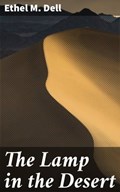In "The Lamp in the Desert," Ethel M. Dell masterfully weaves a poignant narrative set against the backdrop of the harsh yet beautiful landscape of the desert. The novel explores themes of love, sacrifice, and the quest for meaning in a time of turmoil, employing rich, evocative prose that captures both the physical and emotional landscapes of its characters. Dell'Äôs literary style is marked by a lyrical quality, often infusing her storytelling with a sense of spirituality and introspection, reflecting the broader early 20th-century literary movement that sought to delve into the complexities of human experience. Ethel M. Dell, a prominent figure in early 20th-century fiction, wrote "The Lamp in the Desert" at a time when women authors were beginning to carve out their space in literature. Her own experiences'Äîgrowing up in imperial India and witnessing the cultural tensions of her era'Äîdeeply informed her writing. Dell'Äôs ability to portray strong, complex characters often stemmed from her own struggles with societal expectations, offering profound commentary on the female experience within the confines of her time. This novel is highly recommended for readers who appreciate richly descriptive storytelling and character-driven plots. Dell's nuanced portrayal of love amidst adversity provides both an escape and a reflection on the human condition, making it an essential read for anyone interested in early 20th-century literature and the enduring power of hope.

